英文翻译中常见的句型
英语翻译常用句型

翻译中常见的句型1.否定句型1)部分否定。
其否定意义只局限于整体中的一部分。
其形式:“概括词all, every等+not+谓语动词”。
常用于该句型词:all, both, everybody, everywhere, always,altogether, entirely, wholly等。
All is not gold that glitters.I do not wholly agree.2) 完全否定。
其形式:no, none 等否定词+肯定式谓语。
常用于该句型词:no, none, nobody, nothing, nowhere, never, neither, nowhere, nowise, 等。
还有一种句型:all等概括词+肯定式谓语+否定意义的词。
No words can describe the scene.任何言词均不能描绘那景色。
All his plan came to nothing.3)双重否定a.主语+cannot+ help/refrain/keep + from + v-ingHe could not help showing his pleasure.他不由得喜形于色。
b.主语+cannot+ but/choose but/ help but +doThey can not choose but admit that they are wrong.c.(there be) not +主语+but+谓语(There is )Nobody but has his faults. 人人都有缺点。
2.判断句型1)强调判断句a.主语+be+ no/none +other than/but +表语(强调内容)The tall figure that I saw was none other than our commander.b.主语+be+ nothing+(else)but/ else than/ less than+ 表语Genius is nothing but labor and diligence.天才只不过是劳动加勤奋而已。
2020年9月英语六级翻译常见句型_英语四六级翻译万能句式
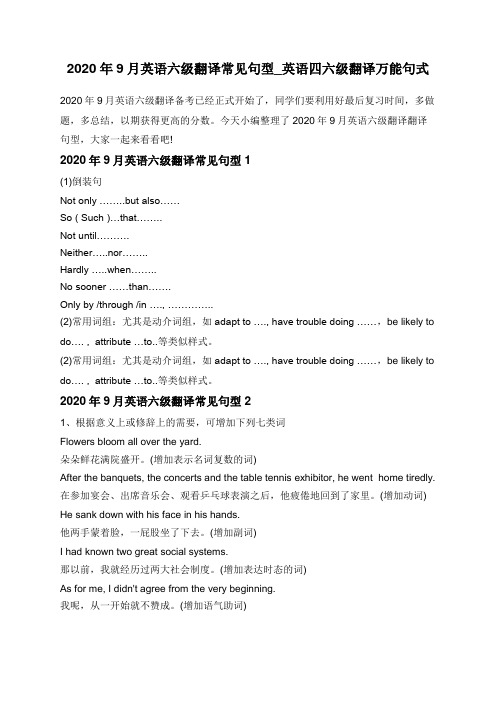
2020年9月英语六级翻译常见句型_英语四六级翻译万能句式2020年9月英语六级翻译备考已经正式开始了,同学们要利用好最后复习时间,多做题,多总结,以期获得更高的分数。
今天小编整理了2020年9月英语六级翻译翻译句型,大家一起来看看吧!2020年9月英语六级翻译常见句型1(1)倒装句Not only ……..but also……So ( Such )…that……..Not until……….Neither…..nor……..Hardly …..when……..No sooner ……than…….Only by /through /in …., …………..(2)常用词组:尤其是动介词组,如adapt to …., have trouble doing ……,be likely to do…. , attribute …to..等类似样式。
(2)常用词组:尤其是动介词组,如adapt to …., have trouble doing ……,be likely to do…. , attribute …to..等类似样式。
2020年9月英语六级翻译常见句型21、根据意义上或修辞上的需要,可增加下列七类词Flowers bloom all over the yard.朵朵鲜花满院盛开。
(增加表示名词复数的词)After the banquets, the concerts and the table tennis exhibitor, he went home tiredly.在参加宴会、出席音乐会、观看乒乓球表演之后,他疲倦地回到了家里。
(增加动词) He sank down with his face in his hands.他两手蒙着脸,一屁股坐了下去。
(增加副词)I had known two great social systems.那以前,我就经历过两大社会制度。
(增加表达时态的词)As for me, I didn't agree from the very beginning.我呢,从一开始就不赞成。
上海高考中译英常用句型结构1
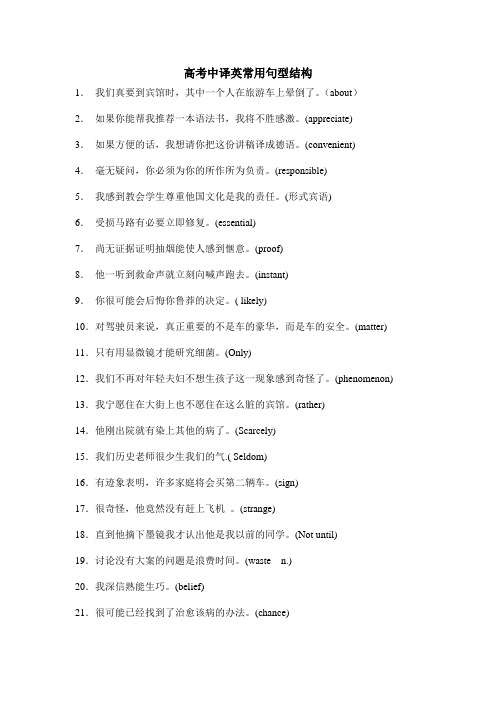
高考中译英常用句型结构1.我们真要到宾馆时,其中一个人在旅游车上晕倒了。
(about)2.如果你能帮我推荐一本语法书,我将不胜感激。
(appreciate)3.如果方便的话,我想请你把这份讲稿译成德语。
(convenient)4.毫无疑问,你必须为你的所作所为负责。
(responsible)5.我感到教会学生尊重他国文化是我的责任。
(形式宾语)6.受损马路有必要立即修复。
(essential)7.尚无证据证明抽烟能使人感到惬意。
(proof)8.他一听到救命声就立刻向喊声跑去。
(instant)9.你很可能会后悔你鲁莽的决定。
( likely)10.对驾驶员来说,真正重要的不是车的豪华,而是车的安全。
(matter) 11.只有用显微镜才能研究细菌。
(Only)12.我们不再对年轻夫妇不想生孩子这一现象感到奇怪了。
(phenomenon) 13.我宁愿住在大街上也不愿住在这么脏的宾馆。
(rather)14.他刚出院就有染上其他的病了。
(Scarcely)15.我们历史老师很少生我们的气.( Seldom)16.有迹象表明,许多家庭将会买第二辆车。
(sign)17.很奇怪,他竟然没有赶上飞机。
(strange)18.直到他摘下墨镜我才认出他是我以前的同学。
(Not until)19.讨论没有大案的问题是浪费时间。
(waste n.)20.我深信熟能生巧。
(belief)21.很可能已经找到了治愈该病的办法。
(chance)22.今天越努力,明天就越不会后悔。
(the more…, the more…)23.我从未像如今这样热爱过中国文学。
(Never)24.我不懂他为何改变主意,也不在乎。
(nor)25.你在其他任何地方也找不到如此齐全的表链收藏。
(Nowhere)26.他从未想过自己是最晚的知噩耗的人.(occur)27.既然没有人支持你,再坚持这个计划就没有意义了。
(point)28.没有收集事实得出结论有何用呢?(point)29.你不可能在一年之内获得所是学位。
英语四级翻译常见句型
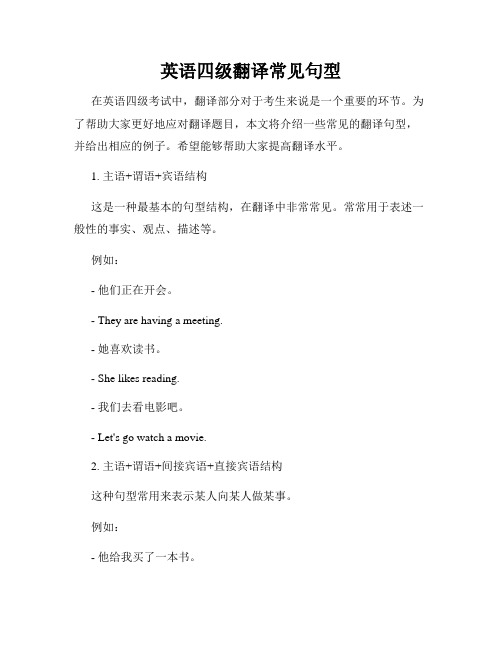
英语四级翻译常见句型在英语四级考试中,翻译部分对于考生来说是一个重要的环节。
为了帮助大家更好地应对翻译题目,本文将介绍一些常见的翻译句型,并给出相应的例子。
希望能够帮助大家提高翻译水平。
1. 主语+谓语+宾语结构这是一种最基本的句型结构,在翻译中非常常见。
常常用于表述一般性的事实、观点、描述等。
例如:- 他们正在开会。
- They are having a meeting.- 她喜欢读书。
- She likes reading.- 我们去看电影吧。
- Let's go watch a movie.2. 主语+谓语+间接宾语+直接宾语结构这种句型常用来表示某人向某人做某事。
例如:- 他给我买了一本书。
- He bought me a book.- 我们给他寄了一封信。
- We sent him a letter.- 她借给我一本小说。
- She lent me a novel.3. 主语+系动词+表语结构这种句型用来表示主语的性质、状态、特征等。
例如:- 青岛是一个美丽的城市。
- Qingdao is a beautiful city.- 他们的想法是正确的。
- Their ideas are correct.- 这个问题很复杂。
- This problem is complicated.4. 主语+系动词+宾语结构这种句型用来表示主语的感觉、看法、认识等。
例如:- 我觉得很累。
- I feel tired.- 他看起来很生气。
- He looks angry.- 他们认为这个计划是有希望的。
- They think the plan is promising.5. 被动语态被动语态在翻译中经常被使用,用来表示主语是动作的承受者。
例如:- 这本小说被翻译成了多种语言。
- This novel has been translated into various languages.- 他被授予了最佳演员奖。
英语翻译(英译汉) 句型翻译

基本句型四: 主+谓(及物)+双 宾(间宾+直宾)
此句型的句子有一个共同特点:谓语动词必须跟有两个 宾语才能表达完整的意思.这两个宾语一个是动作的直 接承受者,另一个是动作的间接承受者.通常这一间接承 受者用一个介词来连接,当动作的间接承受者在动作的 直接承受者之前时,这一介词往往被省略. 1. She │ordered │herself │a new dress. 她给自己定 了一套新衣裳. 2. I │showed │him │my pictures. 我给他看我的照片. 3. He │bought │you │a dictionary.他给你买了一本字 典. 4. I │told │him │that the bus was late. 我告诉他汽 车晚点了. 5. He │showed │me │how to run the machine. 他教 我开机器.
英语翻译(英译汉)
英语的五种基本句型:
主+系+表 主+谓(不及物动词) 主+谓(及物)+宾 主+谓(及物)+双宾(间宾+直宾) 主+谓(及物)+复合宾语(宾+宾补)
基本句型一: 主+系+表
此句型的句子有一个共同的特点:句子谓语动词都不能 表达一个完整的意思,必须加上一个表明主语身份或状 态的表语构成复合谓语,才能表达完整的意思.这类动词 叫做连系动词.系动词分两类:be, look, keep, seem等 属一类,表示情况;get, grow, become, turn等属另一类, 表示变化.be 本身没有什么意义,只起连系主语和表语 的作用.其它系动词仍保持其部分词义. 1. This │is │an English-Chinese dictionary. 这是本英 汉辞典. 2. The dinner │smells │good. 午餐的气味很好. 3. His face │turned │red. 他的脸红了 4. Everything │looks │different. 一切看来都不同了. 5. He │is growing │tall and strong. 他长得又高又壮.
考研英语之翻译常用句型

一、“正话反说”常用句式1.not...without1)They never meet without quarrelling.他们每次见面必吵架。
2)There is no general rule without some exception.所有的普遍规律都有例外。
3)One cannot think of Africa without thinking of Egypt,the cradle of ancient civilization,nor ofEgypt without the Nile.每当人们想起非洲,就必然会想到作为古代文明发祥地的埃及,而一想到埃及,就会想到尼罗河。
另外,人们在出版一本书时,总要在前言里对给予帮助的有关人员表示感谢,在这种情况下,汉语一般是正面提,而英语从反面说,常用此结构。
4)This book could not have been written or published without the help of dozens of people,and Iam deeply grateful to all of them.本书得以编写和出版,还由于很多人的大力协助,我对他们深表谢意。
2.cannot...too英语中的“cannot...too”是一种常见的用否定形式表达肯定意义的结构,它相当于“it is impossible toooverdo...”(无论怎样也不为过)。
1)I cannot be too grateful for his help.对于他给予的帮助,我非常感激。
(我无论怎样感激也不为过)2)The value of the information he has provided cannot be overestimated.他提供的信息非常宝贵。
(其价值无论怎样估计也不为过)3)A book may be compared to your neighbor:if it be good,it cannot last too long;if bad,you cannot get rid of it too early.一本书好比你的邻居:如果是本好书,保持的时间越长越好;如果是本坏书,处理得越早越好。
翻译常用句型
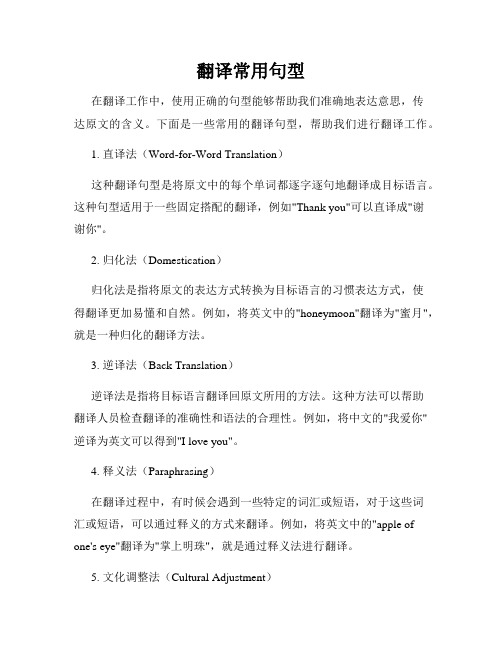
翻译常用句型在翻译工作中,使用正确的句型能够帮助我们准确地表达意思,传达原文的含义。
下面是一些常用的翻译句型,帮助我们进行翻译工作。
1. 直译法(Word-for-Word Translation)这种翻译句型是将原文中的每个单词都逐字逐句地翻译成目标语言。
这种句型适用于一些固定搭配的翻译,例如"Thank you"可以直译成"谢谢你"。
2. 归化法(Domestication)归化法是指将原文的表达方式转换为目标语言的习惯表达方式,使得翻译更加易懂和自然。
例如,将英文中的"honeymoon"翻译为"蜜月",就是一种归化的翻译方法。
3. 逆译法(Back Translation)逆译法是指将目标语言翻译回原文所用的方法。
这种方法可以帮助翻译人员检查翻译的准确性和语法的合理性。
例如,将中文的"我爱你"逆译为英文可以得到"I love you"。
4. 释义法(Paraphrasing)在翻译过程中,有时候会遇到一些特定的词汇或短语,对于这些词汇或短语,可以通过释义的方式来翻译。
例如,将英文中的"apple of one's eye"翻译为"掌上明珠",就是通过释义法进行翻译。
5. 文化调整法(Cultural Adjustment)在进行跨文化翻译时,有时候需要对原文进行文化上的调整,使得翻译更符合目标语言的文化习惯和价值观。
例如,将英文的"black cat"翻译为中文时,可以添加"瑞"或"吉"这样的字眼,因为在中国文化中,黑猫往往象征着好运。
6. 意译法(Free Translation)意译法是指在翻译过程中,将原文的意思进行合理转换,以使得翻译更符合目标语言的语法和表达习惯。
【汉译英】十大日常用语的英文翻译

为了拥有更好的汉泽英水平,那么在接下来的内容中也给出了一些完全的表达,为此大部分的朋友们在意识了以后,自己的英语水平才会更高,所以要好好的把握下,这很有必要。
汉译英的日常句型内容正如下文当中所建议的那样,而大部分的考生们在注意到了过后,自己才会对于日后的每一步更有信心,也正是由于这些了解,自己的英语程度也将会一步步的得到了更好的改善,所以要一直持续的坚持下去。
汉译英的日常句型内容:1.她昨天回家很晚。
She went home very late yesterday evening.2.会议将持续两个小时。
The meeting will last two hours.3.在过去的十年里,我的家乡已经发生了巨大的变化.Great changes have taken place in my home town in the past ten years.4.1919年,在北京爆发了"五.四"运动。
The May Fourth Movement broke outin Beijing in 1919.5.每天八时开始上课。
Classes begin at eight every day.这个箱子重五公斤。
6. This box weighs five kilos.7.五年前我住在北京。
I lived in Beijing five years ago.8.秋天有些鸟飞到南方去。
In autumn, some birds fly to the south.9.我的爷爷早晨起得很早。
My grandfather gets up early in the morning.10. 每天下午有许多学生到图书馆来借书。
A lot of students come to the library to borrow books every afternoon.对于汉译英的日常句型内容,实际上在以上的文章中也给出了一些全面的表达,为此考生朋友们在完全的解析了过后,相信在面对一些学习的难题时,也就可以用心了,所以自己要拥有这些相关的判断,这些方面的努力也是格外的有意义。
四级英语翻译常见句型

四级英语翻译常见句型1、It作先行主语和先行宾语的一些句型She had said what it was necessary to say.2、强调句型It is not who rules us that is important , but how he rules us.3、"All+抽象名词"或"抽象名词+itself"(very+形容词)He was all gentleness to her.4、利用词汇重复表示强调A crime is a crime a crime.5、"something(much)of"和"nothing(little)of" "something of"相当于"to some extent",表示程度。
在疑问句或条件从句中,则为"anything of ",可译为"有点","略微等。
""译为毫无","全无"。
"much of"译为"大有","not much of"可译为"算不上","称不上","little of"可译为"几乎无"。
something like译为"有点像,略似。
"They say that he had no universty education , but he seems to be something of a scholar.6、同格名词修饰是指of前后的两个名词都指同一个人或物,"of"以及它前面的名词构一个形容词短语,以修饰"of"后面的那个名词。
《英语的五种基本句型》
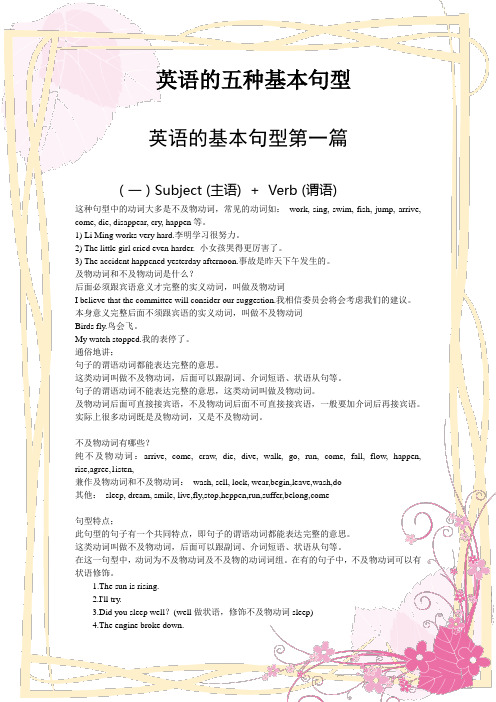
英语的五种基本句型英语的基本句型第一篇(一)Subject (主语) + Verb (谓语)这种句型中的动词大多是不及物动词,常见的动词如:work, sing, swim, fish, jump, arrive, come, die, disappear, cry, happen等。
1) Li Ming works very hard.李明学习很努力。
2) The little girl cried even harder. 小女孩哭得更厉害了。
3) The accident happened yesterday afternoon.事故是昨天下午发生的。
及物动词和不及物动词是什么?后面必须跟宾语意义才完整的实义动词,叫做及物动词I believe that the committee will consider our suggestion.我相信委员会将会考虑我们的建议。
本身意义完整后面不须跟宾语的实义动词,叫做不及物动词Birds fly.鸟会飞。
My watch stopped.我的表停了。
通俗地讲;句子的谓语动词都能表达完整的意思。
这类动词叫做不及物动词,后面可以跟副词、介词短语、状语从句等。
句子的谓语动词不能表达完整的意思,这类动词叫做及物动词。
及物动词后面可直接接宾语,不及物动词后面不可直接接宾语,一般要加介词后再接宾语。
实际上很多动词既是及物动词,又是不及物动词。
不及物动词有哪些?纯不及物动词:arrive, come, craw, die, dive, walk, go, run, come, fall, flow, happen, rise,agree,1isten,兼作及物动词和不及物动词:wash, sell, lock, wear,begin,leave,wash,do其他:sleep, dream, smile, live,fly,stop,heppen,run,suffer,belong,come句型特点;此句型的句子有一个共同特点,即句子的谓语动词都能表达完整的意思。
英语的十种句型

英语的十一种句型1. 不及物动词主语+ 谓语eg: Birds fly.2. 系动词主语+ 系动词+ 表语eg: He looked healthy.3. 及物动词主语+ 谓语+ 宾语eg: Cats catch mice.►有时, 宾语部分是“疑问词+ 动词不定式/宾语从句”常接“疑问词+动词不定式”做宾语的动词有:ask 询问,decide 决定, consider 考虑, discover 发现, explain 解释, forget 忘记, find out 找出, guess 猜想, know 知道, learn 学习, remember 记得, see 看到, settle 决定, tell 说出, understand明白,wonder想知道…eg: I’m wondering how to run the washing machine. He explained how the machine was used.4. 及物动词主语+ 谓语+ 间接宾语+ 直接宾语(双宾语)►常见的带双宾语的动词有: ask, bring, buy, envy, find, get, give, hand, leave, lend, offer, order, pass, pay, send,show, spare, tell, rob, warn, wish…eg: Pass me the pen, please. =Pass the pen to me, please.谓语间宾直宾谓语直宾间宾翻译: “他带给我一支笔.”He brought me a pen.= He brought a pen to me.当间接宾语是代词时, 通常用“主语+ 谓语+ 直接宾语+ 介词to+ 间接宾语”的动词有: bring, carry, give, hand, offer, owe, pass, pay, read, sell, send, show, take, write…►常用“介词for+ 间接宾语”的动词有:buy, choose, fetch, get, make, order…主语+ 谓语+ 间接宾语+ 直接宾语(疑问词+ 动词不定式)动词advise, ask, inform, remind, show, teach, tell等常接“疑问词+ 动词不定式”作直接宾语eg: I had to ask him how to send e-mail.He taught her how to skate.思考: 以上两个句子的主语. 宾语. 直宾和间宾分别是什么?5. 及物动词主语+ 谓语+ 宾语+ 宾语补足语(复合宾语)能接宾语补足语的动词很多,主要有以下的七种用法:①主语+ 谓语+ 宾语+宾补(形容词)②主语+ 谓语+ 宾语+ 宾补(名词)►常用此句型的动词有: call, choose, elect, make, name…翻译“他叫他的猫宝宝.”He called his cat Baby.③主语+ 谓语+ 宾语+ 宾补(副词)翻译“我们看到他进去.”We saw him in.④主语+ 谓语+ 宾语+ 宾补(不带to的动词不定式)►常接不带to的动词不定式的动词有: make, let, have, feel, hear, notice, see, watch, observe…eg: His terriblestories made our blood freeze.翻译“我看到他进来和出去.”I saw him come in and go out.⑤主语+ 谓语+ 宾语+ 宾补(带to的动词不定式)翻译“提醒我写信给妈妈.”Remind me to write to mother.常接带to的动词不定式的动词有: advise, allow, ask, beg, cause, choose, encourage, expect, force, get, hate, help, intend, invite, leave, like, love, order, permit, persuade, prefer, remind, teach, tell, want, warn, wish…⑥主语+ 谓语+ 宾语+ 宾补(现在分词)►常接现在分词作宾补的动词有: catch, feel, find, hear, imagine, keep, leave, listen to, look at, notice, see, set,start, watch…翻译“他们感觉那辆小车跑得很快.”They felt the car moving fast.⑦主语+ 谓语+ 宾语+ 宾补(过去分词)►常接过去分词作宾补的动词有: feel, get, have, hear, like, find, make, prefer, see, want, wish…翻译“我刚听到玻璃破了.”I heard the glass broken just now.六.主语+谓语(不及物动词)+介词+宾语eg: He arrived in shanghai last night.七.It (形式主语)+ be +表语+ that主语+ 谓(+---)真正的主语eg: It is useful that you learn English well.八.There be + 主语+ 状语.(倒装句)eg. There are five students in the classroom.There is a girl under the tree.九.It (形式主语)+ be + adj.(表语) +for/of )+ sb.+to do sth.真正的主语eg: It is very kind of you to help me. It is very important (for you) to learn English.常接形容词作宾补的动词有: break, cut, fill, get, hold, keep, leave, make, paint, pull, push, set, wash, wipe…翻译“我们马上就把一切准备好了.”We will get everything ready.十.It is/was + 被强调成分+ that (强调人或物时用that,强调人时用who)+剩余的其它成分.(强调句)eg: It is you that/who are wrong.. It was you that/who took my pen.It is the house that he lives in. It was the factory that we once worked in.十一。
翻译技巧 常见句型的翻译
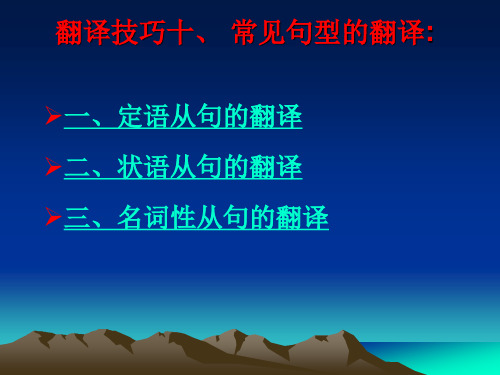
6. He liked his sister, who was warm and pleasant, but he did not like his brother, who was aloof冷漠 and arrogant高傲.
他喜欢热情愉快的妹妹,而不喜欢冷漠高傲的哥哥。
II . 译成后置定语
18.You are the only person who could do it.
只有你才能做这件事。
19. He has a son of twenty who is now at the
college. 他有个二十岁的儿子现在正上大学。 20. This was the first time I had serious trouble with my leader.
二、状语从句的翻译
I. 按照原文顺序译出状语从句
1. If you do not mind, I will turn off the heating. 如果你不介意,我就把暖气关上了。
2. As far as I know, there isn’t such a word in English.
翻译技巧十、 常见句型的翻译:
一、定语从句的翻译 二、状语从句的翻译 三、名词性从句的翻译
一、定语从句的译法
Attributive clauses are widely used in English. In many cases, sentences are made very long because of attributive clauses. Hence it is important to have a correct comprehension and an accurate translation of attributive clauses. Different attributive clauses may express different meanings such as purpose, concession, result and so on. An attributive clause usually follows the word it modifies. This is different from Chinese. In Chinese there is no post-position attribute and there can’t be too many modifiers preceding the modified word. All this causes changes in translating some
英译汉中常见重要短语典型句型
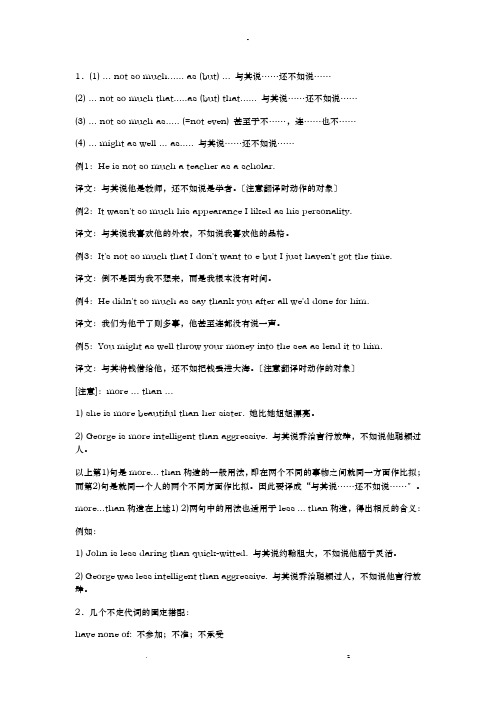
1.(1) ... not so much...... as (but) ... 与其说……还不如说……(2) ... not so much that.....as (but) that...... 与其说……还不如说……(3) ... not so much as..... (=not even) 甚至于不……,连……也不……(4) ... might as well ... as..... 与其说……还不如说……例1:He is not so much a teacher as a scholar.译文:与其说他是教师,还不如说是学者。
〔注意翻译时动作的对象〕例2:It wasn't so much his appearance I liked as his personality.译文:与其说我喜欢他的外表,不如说我喜欢他的品格。
例3:It's not so much that I don't want to e but I just haven't got the time.译文:倒不是因为我不想来,而是我根本没有时间。
例4:He didn't so much as say thank you after all we'd done for him.译文:我们为他干了则多事,他甚至连都没有说一声。
例5:You might as well throw your money into the sea as lend it to him.译文:与其将钱借给他,还不如把钱丢进大海。
〔注意翻译时动作的对象〕[注意]:more ... than ...1) she is more beautiful than her sister. 她比她姐姐漂亮。
2) George is more intelligent than aggressive. 与其说乔治言行放肆,不如说他聪颖过人。
常见句式的翻译

七、An advantage of ~~~ is that + 句子 (...的优点是...) ...的优点是 ) 的优点是... 使用太阳能的优点是它不会制 造任何污染。 造任何污染。
An advantage of using the solar energy is that it won’t won’ create (produce) any pollution.
It is conceivable that knowledge plays an important role in our
lhe reason why ~~~ (那就是...的原因) 那就是...的原因 的原因) 夏天很闷热。 夏天很闷热。那就是我不喜欢它的 原因。 原因。
Summer is sultry(hot without sultry( wind) wind). That is the reason why I don’t like it. don’
二十一、 时间, 二十一、For the past+ 时间, S + 现在完成式...(过去...年 现在完成式...(过去...年 ...一直 ) 一直... 来,...一直...) 过去两年来,我一直忙着准备考试。 过去两年来,我一直忙着准备考试。
二十四、 二十四、be based on (以... 为基础) 为基础) 社会的进步是以和谐为基础的。 社会的进步是以和谐为基础的。
The progress of the society is based on harmony.
二十五、 二十五、Spare no effort to + V (不遗余力的) 不遗余力的) 我们应该不遗余力的美化我们的环 境。
十、Adj + as + Subject(主词)+ Subject(主词) be, S + V~~~ (虽然...) 虽然...) {by no means = in no way = on no account 一点也不} 一点也不} 虽然我们的国家富有, 虽然我们的国家富有,我们的生 活品质绝对令人不满意。 活品质绝对令人不满意。
英语翻译
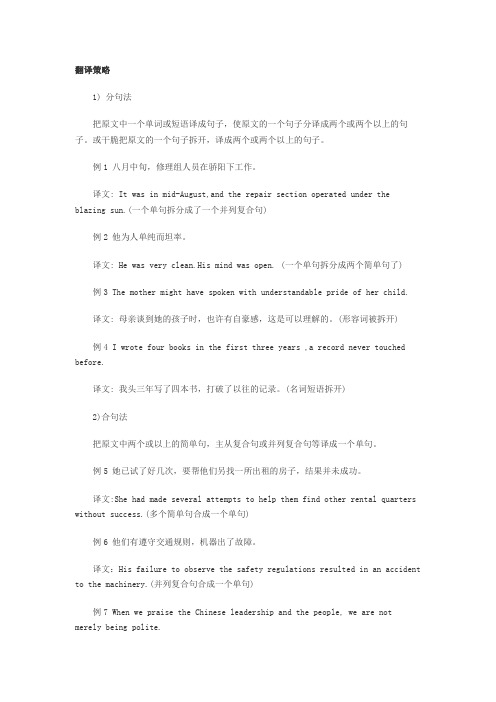
翻译策略1) 分句法把原文中一个单词或短语译成句子,使原文的一个句子分译成两个或两个以上的句子。
或干脆把原文的一个句子拆开,译成两个或两个以上的句子。
例1 八月中旬,修理组人员在骄阳下工作。
译文: It was in mid-August,and the repair section operated under the blazing sun.(一个单句拆分成了一个并列复合句)例2 他为人单纯而坦率。
译文: He was very clean.His mind was open. (一个单句拆分成两个简单句了)例3 The mother might have spoken with understandable pride of her child.译文: 母亲谈到她的孩子时,也许有自豪感,这是可以理解的。
(形容词被拆开)例4 I wrote four books in the first three years ,a record never touched before.译文: 我头三年写了四本书,打破了以往的记录。
(名词短语拆开)2)合句法把原文中两个或以上的简单句,主从复合句或并列复合句等译成一个单句。
例5 她已试了好几次,要帮他们另找一所出租的房子,结果并未成功。
译文:She had made several attempts to help them find other rental quarters without success.(多个简单句合成一个单句)例6 他们有遵守交通规则,机器出了故障。
译文:His failure to observe the safety regulations resulted in an accident to the machinery.(并列复合句合成一个单句)例7 When we praise the Chinese leadership and the people, we are not merely being polite.译文:我们对中国领导人和中国人民的赞扬不仅仅是出于礼貌。
医学英语的常见句型与翻译
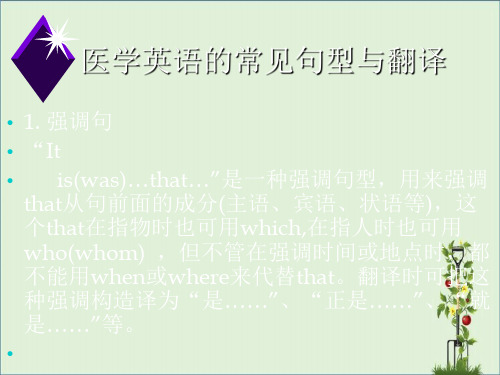
•
● Enlargement of the liver and spleen occurs
early, but rarely are lymph nodes tender.
• 早期消失肝脾肿大,但淋巴结压痛确属罕见。
•
• ● On no account should any medicine be given in such cases.
• that…,表示“建议”、“要求”、“必需”做的事。 从句中的should有时可省略。
•
●should be型虚拟语气还可用在lest引起的目的
状语从句和由连词whether(不管)引起的让步状语从句。
•
● It is important that the malignant tumour be
•
• ●It is the breast that is the leading organ site for cancer in American women.
• 乳房是美国妇女癌症的首先好发的器官位置。
• ●It is when the body temperature is rising rapidly that the affected person may feel chilly. 正是在体温上升时患者可感觉发冷。
非事实,而只是一种假设、愿望、建议而已。一般有以
下几种状况:
•
5.1 虚拟语气在非真实条件句中的应用
•
在非真实条件从句中的动词虚拟语气可分为三类:
• (1)were型(表示与现在事实相反);
• (2)should be型(表示与将来事实相反);
• (3)had been型(表示与过去事实相反)。
英语六级翻译常用句型

英语六级翻译常用句型英语六级翻译常用句型大学英语六级考试(又称CET-6,全称为“College English Test-6”)是由国家统一出题的,统一收费,统一组织考试,用来评定应试人英语能力的全国性的考试,每年各举行两次。
下面为大家带来英语六级翻译常用句型,快来看看吧。
英语六级翻译常用句型1第一类:表示原因1) There are three reasons for this.2) The reasons for this are as follows.3) The reason for this is obvious.4) The reason for this is not far to seek.5) The reason for this is that…第二类:表示益处/害处表示益处:1) It has the following advantages.2) It does us a lot of good.3) It benefits us quite a lot.4) It is beneficial to us.5) It is of great benefit to us.6) We have good reason to believe that…表示害处:1) It has more disadvantages than advantages.2) It does us much harm.第三类:表示变化1) Some changes have taken place in the past five years.2) A great change will certainly be produced in the worlds communications.3) The computer has brought about many changes in education.第四类:表示重要性1) doing sth. is of utmost importance / should be given priority2) it is admitted that sb. should do3) It plays an important role in our life.第五类:表示措施1) We should take some effective measures.2) It is high time we tried our best to overcome(conquer)the difficulties.3) Great effort is needed to…4) There are several ways to deal with the problem.第六类:表示事实现状(首段常见)1) We cannot ignore the fact that…2) No one can deny the fact that…/ There is no denying the fact that…3) indeed / apparently / obviously4) This is a phenomenon that many people are interested in.5) It is true that…第七类:表示比较1) Compared with A,B……2) I prefer to read rather than watch TV.3) There is a striking contrast between them.第八类:表示看法(首段或尾段)1) People have(take,adopt,assume)different attitudes towards sth.2) from my point of view3) People take different views of(on)the question.4) Some people believe that…Others argue that…5) in terms of...英语六级翻译常用句型21.…as soon as… 一……就……(1) Peter一听到消息就兴奋地喊起来。
翻译常见词组及句型
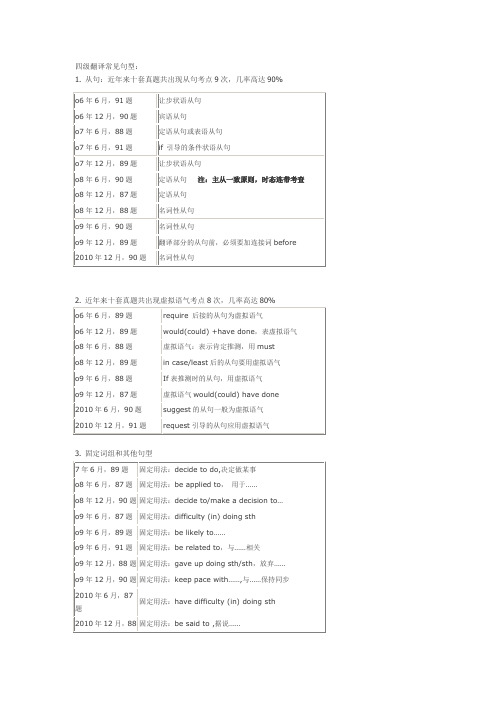
四级翻译常见句型:1. 从句:近年来十套真题共出现从句考点9次,几率高达90%2. 近年来十套真题共出现虚拟语气考点8次,几率高达80%3. 固定词组和其他句型四六级最后的翻译题常考词组100条1. at the thought of一想到…2. as a whole (=in general) 就整体而论3. at will 随心所欲4. (be) abundant in(be rich in; be well supplied with) 富于,富有5. access(to) (不可数名词) 能接近,进入,了解6. by accident(=by chance, accidentally)偶然地,意外. Without accident(=safely) 安全地,7. of one’s own accord(=without being asked; willingly; freely)自愿地,主动地8. in accord with 与…一致. out of one’s accord with 同…。
不一致9. with one accord (=with everybody agreeing)一致地10. in accordance with (=in agreement with) 依照,根据11. on one’s own account1) 为了某人的缘故,为了某人自己的利益2) (=at one’s own risk) 自行负责3) (=by oneself)依靠自己12. take…into account(=consider)把..。
考虑进去13. give sb. an account of 说明,解释(理由)14. account for (=give an explanation or reason for) 解释,说明。
15. on account of (=because of) 由于,因为。
- 1、下载文档前请自行甄别文档内容的完整性,平台不提供额外的编辑、内容补充、找答案等附加服务。
- 2、"仅部分预览"的文档,不可在线预览部分如存在完整性等问题,可反馈申请退款(可完整预览的文档不适用该条件!)。
- 3、如文档侵犯您的权益,请联系客服反馈,我们会尽快为您处理(人工客服工作时间:9:00-18:30)。
翻译中常见的句型
1.否定句型
1)部分否定。
其否定意义只局限于整体中的一部分。
其形式:“概括词all, every等+not+谓语动词”。
常用于该句型词:all, both, everybody, everywhere, always, altogether, entirely, wholly等。
All is not gold that glitters.
I do not wholly agree.
2) 完全否定。
其形式:no, none 等否定词+肯定式谓语。
常用于该句型词:no, none, nobody, nothing, nowhere, never, neither, nowhere, nowise, 等。
还有一种句型:all等概括词+肯定式谓语+否定意义的词。
No words can describe the scene.
任何言词均不能描绘那景色。
All his plan came to nothing.
3)双重否定
a.主语+cannot+ help/refrain/keep + from + v-ing
He could not help showing his pleasure.他不由得喜形于色。
b.主语+cannot+ but/choose but/ help but +do
They can not choose but admit that they are wrong.
c.(there be) not +主语+but+谓语
(There is )Nobody but has his faults. 人人都有缺点。
2.判断句型
1)强调判断句
a.主语+be+ no/none +other than/but +表语(强调内容)
The tall figure that I saw was none other than our commander.
b.主语+be+ nothing+(else)but/ else than/ less than+ 表语
Genius is nothing but labor and diligence.天才只不过是劳动加勤奋而已。
c.it is/was +强调部分+that/ who +从句
It is I who am to blame.
2) 正反判断句
a.主语+be +not+表语a, but +表语b
What I admire in Columbus is not his discovered a world, but his having gone to search for it on the faith of an opinion.
b.(it is) not… that(who) …, but…that (who)
Not that we are afraid of them, but that they are afraid of us.
3)比较判断句:
a.主语+be less+表语a +than表语b / more+表语b+表语a
Experience shows that success is due less to abilities than to zeal.
b.主语+be+表语b+ rather than+表语a
He is an artist rather than a philosopher.
c.主语+be+ not so much +表语a+ as+表语b
It is so much advice as approval that he seeks. 他寻求的与其说是忠告,不如说是忠告。
3.倍数表示句型:
a.主语+be+倍数+that of 被比较对象/ as +形容词+as+被比较对象
In this workshop the output is four times that of January.
b.主语+increase/rise/attain+(to) 倍数+compared with+被比较对象
Now the industry of the country has attained 6 times of last year.
c.主语+increase+(by)百分数+ (compared with)
Many counties have increased their farm output by 100 percent in a short time.
4. 比较句型
1)等比句型
a. 主语+谓语+as+ adj./adv. +as+ as+被比较对象
He is as tall as I am.
b. 主语+谓语+no more/less+ adj./adv.+ than被比较对象
She is no less diligent than her sister.
2)其他比较句型
我would (had) rather… than/ ….rather than…
…would sooner than…
Sooner than do such work, I would starve.我你愿饿死,也不干这工作。
5. 程度句型
1) a.so… that…/ such…that
The difference is such that all will perceive it.
d.主语+谓语+程度状语so/such +adj./adv. +as + to do
Your stupidity is cu as to fill me with despair.
1)too… to
It is too good to be true.
6. 倒装让步句型
a.表语+as +主语(代词)+联系动词,+主句
b.表语+联系动词+主语(名词) ,+主句
c.副词/动词原形+as +主语,+主句
Disabled as is Paul, he is trying his best to serve the people.
Try as we might, we could not accomplish it.
7. It 作形式主语的常艰句型
a.It is+ adj.+ that
It is possible that the students come this afternoon.
b.It 不及物动词+that
It turns out that the price begins to go down.
c.It be +名词+that…
It was the case that everything was in a mess.
d.It be +done + that
It is said that a foreign teacher will come to our class.。
